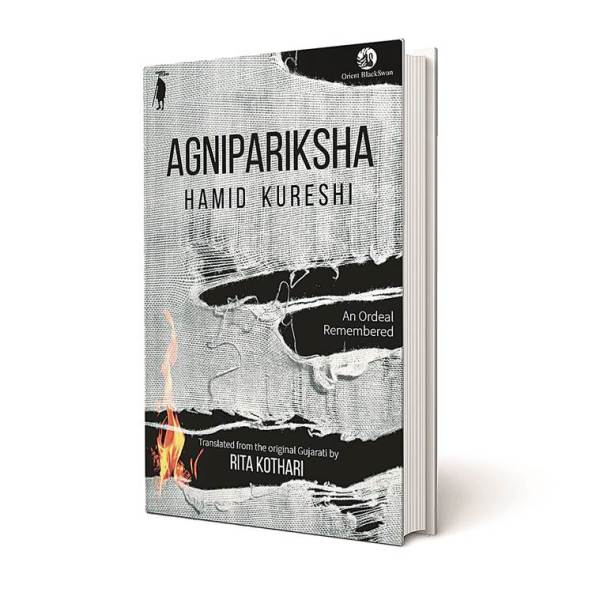Trial by Fire
Hamid Kureshi’s memoir is a stark reminder of the 1969 Ahmedabad riots and the need to tackle the communal flames of polarisation.
Updated: August 4, 2018 5:28:30 pm
 Written by JS Bandukwala
Written by JS BandukwalaAgnipariksha is a memoir of trauma and hope set against the 1969 Ahmedabad riots. It was written by Hamid Kureshi, grandson of Imam Saheb, who left South Africa with Gandhiji, and helped establish the Ashram at Ahmedabad. The Mahatma honored him as “Sahodar”, meaning born of the same womb.
Hamidbhai’s wife, Pratima Kotak ’s family, also belonged to the Gandhi Ashram. Hamidbhai’s family deeply imbibed the ashram’s atmosphere of communal brotherhood. No wonder his closest friends were the political and cultural icons of that period, among them Madhav Singh Solanki, a future Chief Minister; Sneharashmi, Gujarat’s leading poet; the Jamnalal Bajaj family and the noted thinker Yashwant Shukla. Professor Rita Kothari of Ashoka University rightly said of Hamidbhai, “He lived in words and spirit, a life of religious and cultural pluralism. Sadly, such a man became a target of frenzied communal mobs in the serious communal breakdown in Ahmedabad in 1969. His house was charred. Unprepared for the assaults on his life and property, he was shaken by the hatred directed at him. He was a non-practicing Muslim, married to a Hindu. Yet he could not escape his Muslim identity. The attack by Hindu mobs broke his spirit.
The backdrop of the riots was the split in the Congress between the followers of Indira Gandhi and those of Morarji Desai. In India, political turmoil is always an invitation to unscrupulous elements to seek advantage through polarising and communalising society. All you need is inflammatory rhetoric widely covered in the local media. This was provided by a report of an attack on the Jagannath temple in Ahmedabad. The city exploded into mad fury just before the country was to celebrate the Mahatma’s centenary. The resultant killings, especially those involving children and women, were a black mark in the country’s history. I remember a function held at my American university, in which leading citizens praised Gandhiji as an apostle of non-violence and as one who inspired Martin Luther King. The contrast between that praise and the TV news of the day was macabre.
Within the country, there was shock that Badshah Khan, Gandhiji’s close associate, was to visit Ahmedabad, after spending most of his life since 1947 in a Pakistani jail. He came to the city and the Ashram to find peace in the memory of his friend and mentor. What he found instead was a city brutally divided into ghettos, with thousands ruined and homeless. A massive internal migration had begun with Muslims moving into Muslim pockets and Hindus into Hindu pockets. Fifty years later, these communal enclaves have become permanent, to the extent that the boundary separating Muslim and Hindu areas is known as the border.
Kureshi continued to practice law in the High Court and the Supreme Court. He died in 2016. But he was not the Hamid of the period before 1969. He had moved away from social activism. He remained connected to the Sabarmati Ashram. But as far as can be made out, he had almost no links with the Muslims of Ahmedabad. Among his progeny, only one is publicly visible. His son Akil is a highly respected High Court Judge. But the family has been drained of social activism.
This withdrawal from public life has hurt Ahmedabad and Gujarat. Imam Saheb’s unusual bonding with the Mahatma was a bridge we all needed. Sadly, Godhra 2002 and the rise of Narendra Modi has made a new bridge well-nigh impossible. This can be best seen by the sharp fall in elected Muslim leaders in the last four decades. Gujarat has not sent a single Muslim to the Lok Sabha for three decades. At the Assembly level, as per the population figures, there should be at least 18 Muslims MLAs. We barely have three now. One rarely finds Muslims in the police, the bureaucracy or in any important trade, business or government body. In truth, Narendra Modi has succeeded in making Muslims disappear into the bowels of their ghettos.
Fortunately, Muslims have turned towards education and social change. It is common to see parents striving hard to send their children to good schools and colleges. When the results are out, local newspapers are full of photos of minority students who have excelled. There is genuine concern about those poor families who may never be able to come out of poverty and illiteracy. But special classes are being held to provide them free coaching. A number of charities have also been set up to provide scholarships to school and college students. Doctors use their Sundays to run free medical camps in poor localities.
Whether all this effort leads to a concrete shift in the future remains to be seen. This is our Agni Pariksha. And god willing, we will clear it.
The writer is a former physics professor and a human rights activist based in Vadodara.
For all the latest Lifestyle News, download Indian Express App






















No hay comentarios:
Publicar un comentario